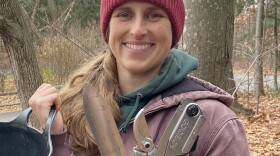-
Here’s how to keep live potted herbs from the grocery thriving, maybe even long enough to plant outside in spring.
-
Forcing bulbs indoors is a way to bring spring cheer into the house if you have some bulbs that didn’t make it into the ground before it froze.
-
Anna Wallingford is an entomologist by training. She wants to be a resource for farmers, gardeners and homesteaders who are curious about environmentally-friendly pest management. She calls it "a CSA, but for science."
-
With a blanket of white, you can really get a look at the bones of your garden and think about garden design principles and plans.
-
Anticipate planting tender flowers and vegetables in the garden around Memorial Day and count backwards depending on the seed.
-
A simple test you can do at home can determine whether your old seeds are worth using this year.
-
If you’re dreaming of picking apples or pears from your own garden in the fall, here are some recommendations for success getting started growing fruit trees.
-
Snow, ice, and wind can take a toll on evergreen shrubs.
-
Be aware that some of the most popular holiday plants can be quite toxic if ingested.
-
One of the best things about shopping for gardeners is that whatever you choose, it is likely they’ll use it for years to come.

Play Live Radio
Next Up:
0:00
0:00
Available On Air Stations










